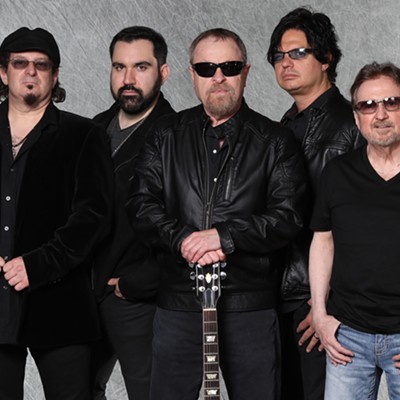It takes Harry J. Riley a while to warm up to new people. He rolls the shoulders of his broad frame — making himself smaller — and nods gently when others speak. He delivers succinct sentences in a hushed voice. You could say he’s shy.
But underneath all the calm and quiet, Harry J. Riley is a bomb waiting to detonate.
On the stage, he takes lunging steps, flails his arms, and with wide eyes, pushes his voice to boom in a way that turns his tinge of a Southern accent into a full-on drawl.
It’s a relatively new development, these polarized personas.
In the past few years, Riley’s comedy act has taken him on tours through the Western states, scored him top places at comedy competitions, and earned him a place in local sketch comedy group the Rube Goldberg Device. At the age of 30, the Air Force veteran and senior in criminal justice at Eastern Washington University is finding himself ranked as one of the strongest standup comedians in the region. He’s also been in a movie with Snoop Dogg.
So when this force steps off the stage and reverts back to his natural, quiet state, you have to wonder — who is this person?
Riley’s memories of his childhood are patchy, but he does remember sleeping on porches. He grew up in St. Matthew’s, N.C., a 56.9-square-mile township near the state capital, Raleigh.
His family, he says, didn’t have a lot of money. Instead of staying with his mother and five siblings, Riley opted to live with his father as a child.
“All I know was that we were living together and then he lost his house,” says Riley. “We didn’t really have a place to stay, so during the nighttime we would lay on people’s porches.”
Riley recalls he was about 12 when he learned that his dad was sick with what he thinks was lung cancer. That’s when things started to change.
“I remember one time it was Super Bowl Sunday. I think he was embarrassed because he didn’t have a place to go, we just basically spent the whole night walking around until I got too tired,” says Riley.
Riley doesn’t call that period of his life a dark time. He remembers the good — how his dad would listen to the stories he wrote, encouraging his creative writing. The wayfaring lifestyle didn’t bother him. It was simple.
“Maybe because I loved him so much, I was just like, well, wherever he’s going, that’s where I’m going.”
After Riley’s dad passed away, he went to live with his mother. As a teenager, he dabbled in petty crime, but he says he didn’t have the nerves for that line of work. Riley began to look at his options. Staying in St. Matthew’s meant going to work in the chicken-processing plant where his relatives worked. Staying also meant living in a town where he, a shy kid who just liked to read and write stories, felt alien.
“I was just too odd for that town,” says Riley. “I had to get out and do something.”
That’s when Riley took off for the Air Force and was sent thousands of miles away to Airway Heights, Wash. Then to Iraq.
And that’s when Riley got sick.
“I was in Iraq and I was getting headaches and breaking out all the time, and they didn’t know what was going on,” says Riley.
His appearance deteriorated rapidly — he lost hair, and his face was overtaken by open lesions. Doctors determined it was due to photo-sensitivity brought on by lupus.
After two months abroad, the military sent him home and set him free. He didn’t know what to do.
“I thought the military was going to be my entire life,” says Riley. I didn’t see anything good happening, so I thought, ‘Before I do something stupid, let me try comedy.’”
So with a friend in tow and no jokes prepared, Riley took the stage at a comedy open mic at the now-defunct Brickwall Comedy Club in Spokane. That night, something clicked.
“People always told me I should try it, but I was like, ‘I
can’t stand up in front of dozens of people and talk to them. I have
enough trouble as it is talking to one person,’” he says. “Now the
opposite is true.”
Of Spokane County’s 470,000-plus residents, 89.2 percent are white, according to 2010 U.S. Census data. Riley is aware of this. Being a black comedian in a predominately white area, he says, has played a part in determining the trajectory of his act. As a performer, he’s grown used to the demographics of this part of the country.
“I started doing comedy in all-white areas of the country, so when I do a show in front of nothing but black people, I kinda psych myself out,” Riley said in an email. “The things I like to make fun of are sometimes just of no interest to a black room. They don’t want to hear about Bigfoot and pandas.”
Riley says his blend of comedy is great for where he lives and who he is. His jokes speak to his creative-writing background, and his delivery brings his cartoonish, absurd humor home for audiences, black or white.
Through the rough childhood, the military, illness and school, Riley found a place to put the shy kid away. At least for a time.
“It’s weird how some things work to make you be a better person,” says Riley. ν
Harry J. Riley performs with guests • Fri, Nov. 25 and Sat, Nov. 26 at 8 pm • Uncle D’s Comedy Underground • 2721 N. Market St. • $12 • 21 • bluznews.com • 483-7300





















